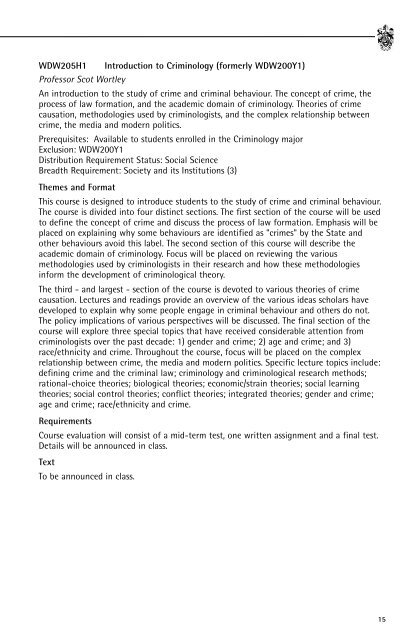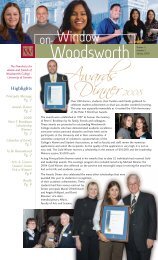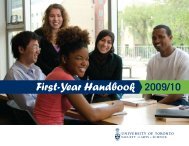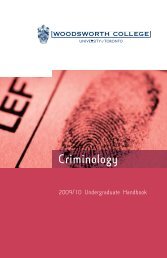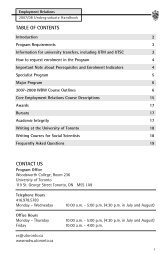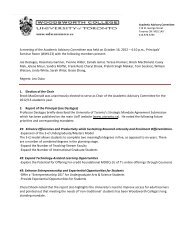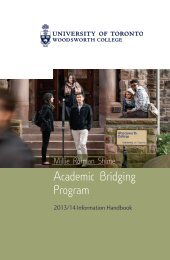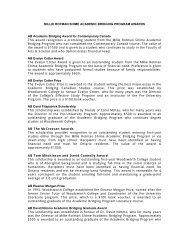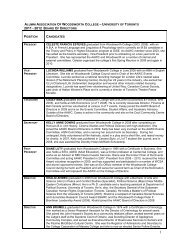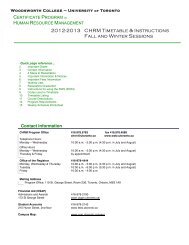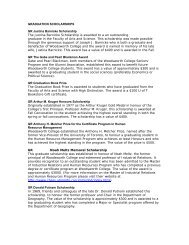2011-2012 - Woodsworth College - University of Toronto
2011-2012 - Woodsworth College - University of Toronto
2011-2012 - Woodsworth College - University of Toronto
You also want an ePaper? Increase the reach of your titles
YUMPU automatically turns print PDFs into web optimized ePapers that Google loves.
WDW205H1 Introduction to Criminology (formerly WDW200Y1)<br />
Pr<strong>of</strong>essor Scot Wortley<br />
An introduction to the study <strong>of</strong> crime and criminal behaviour. The concept <strong>of</strong> crime, the<br />
process <strong>of</strong> law formation, and the academic domain <strong>of</strong> criminology. Theories <strong>of</strong> crime<br />
causation, methodologies used by criminologists, and the complex relationship between<br />
crime, the media and modern politics.<br />
Prerequisites: Available to students enrolled in the Criminology major<br />
Exclusion: WDW200Y1<br />
Distribution Requirement Status: Social Science<br />
Breadth Requirement: Society and its Institutions (3)<br />
Themes and Format<br />
This course is designed to introduce students to the study <strong>of</strong> crime and criminal behaviour.<br />
The course is divided into four distinct sections. The first section <strong>of</strong> the course will be used<br />
to define the concept <strong>of</strong> crime and discuss the process <strong>of</strong> law formation. Emphasis will be<br />
placed on explaining why some behaviours are identified as "crimes" by the State and<br />
other behaviours avoid this label. The second section <strong>of</strong> this course will describe the<br />
academic domain <strong>of</strong> criminology. Focus will be placed on reviewing the various<br />
methodologies used by criminologists in their research and how these methodologies<br />
inform the development <strong>of</strong> criminological theory.<br />
The third - and largest - section <strong>of</strong> the course is devoted to various theories <strong>of</strong> crime<br />
causation. Lectures and readings provide an overview <strong>of</strong> the various ideas scholars have<br />
developed to explain why some people engage in criminal behaviour and others do not.<br />
The policy implications <strong>of</strong> various perspectives will be discussed. The final section <strong>of</strong> the<br />
course will explore three special topics that have received considerable attention from<br />
criminologists over the past decade: 1) gender and crime; 2) age and crime; and 3)<br />
race/ethnicity and crime. Throughout the course, focus will be placed on the complex<br />
relationship between crime, the media and modern politics. Specific lecture topics include:<br />
defining crime and the criminal law; criminology and criminological research methods;<br />
rational-choice theories; biological theories; economic/strain theories; social learning<br />
theories; social control theories; conflict theories; integrated theories; gender and crime;<br />
age and crime; race/ethnicity and crime.<br />
Requirements<br />
Course evaluation will consist <strong>of</strong> a mid-term test, one written assignment and a final test.<br />
Details will be announced in class.<br />
Text<br />
To be announced in class.<br />
15


